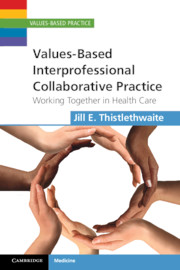Book contents
- Frontmatter
- Contents
- Preface
- Forewords
- Part 1 Introduction and theory
- Part 2 Primary care and the primary health care team
- 4 A patient complaint: team meetings, policy and practice values – raising awareness in the team
- 5 A well person health check, health promotion and disease prevention: different lifestyles, different values
- 6 A patient with medically unexplained symptoms: applying evidence and values for shared decision-making, self-care and co-production of health
- 7 A request for strong analgesia: honesty and trust
- 8 Asylum seekers and refugees: working across cultures
- 9 A request for a home birth and other pregnancy-related consultations
- 10 Community-based care and the wider health care team
- 11 Ageing and end of life decisions
- 12 Referrals and the interface between primary and secondary care: looking after ‘our’ patients
- 13 Living with visible difference and valuing appearance
- 14 Collaboration with other professionals: in and outside health care
- 15 Learning in and about teams
- Afterword
- Index
- References
15 - Learning in and about teams
Published online by Cambridge University Press: 05 October 2012
- Frontmatter
- Contents
- Preface
- Forewords
- Part 1 Introduction and theory
- Part 2 Primary care and the primary health care team
- 4 A patient complaint: team meetings, policy and practice values – raising awareness in the team
- 5 A well person health check, health promotion and disease prevention: different lifestyles, different values
- 6 A patient with medically unexplained symptoms: applying evidence and values for shared decision-making, self-care and co-production of health
- 7 A request for strong analgesia: honesty and trust
- 8 Asylum seekers and refugees: working across cultures
- 9 A request for a home birth and other pregnancy-related consultations
- 10 Community-based care and the wider health care team
- 11 Ageing and end of life decisions
- 12 Referrals and the interface between primary and secondary care: looking after ‘our’ patients
- 13 Living with visible difference and valuing appearance
- 14 Collaboration with other professionals: in and outside health care
- 15 Learning in and about teams
- Afterword
- Index
- References
Summary
This chapter focuses more specifically on how teams can learn to work together and education that facilitates developing skills for collaboration. In particular I discuss the concept and context of interprofessional education (IPE) and its role in understanding and working together within a values-based framework. There are two examples of interprofessional learning activities for practice teams.
Reflection point
Consider what you already know about IPE. Do you know of any definitions of IPE? In your own career how have you learnt the theory behind and skills for teamwork? Did this learning ever include outcomes relating to values-based practice?
One of the perplexing features of contemporary health care professional education, both before and after qualification, is that there is still comparatively little learning in and about teams, teamwork and collaborative practice. This is in spite of the growing awareness of the need for and development of teamwork in health care. Skills for teamwork, leadership and collaborative practice do now appear as core competencies in many health professional curricula. Some of the learning to achieve these outcomes does take place in groups and teams; some of the learning is multiprofessional and some interprofessional (Box 15.1), but summative (endpoint) assessment for qualification or registration is always of the individual. In my experience, rarely is there specific mention of values in current health professional education: individual, team, organisation or values-based practice.
- Type
- Chapter
- Information
- Values-Based Interprofessional Collaborative PracticeWorking Together in Health Care, pp. 158 - 169Publisher: Cambridge University PressPrint publication year: 2012

